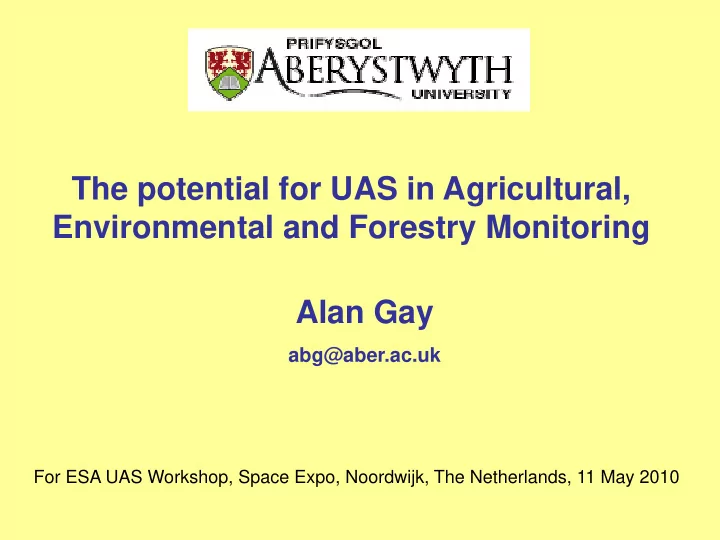

The potential for UAS in Agricultural, Environmental and Forestry Monitoring Alan Gay abg@aber.ac.uk For ESA UAS Workshop, Space Expo, Noordwijk, The Netherlands, 11 May 2010
The Land-use Sector Agriculture UK Gross output £15 billion (1% of UK economy) 4.3% growth in 2006 300,000 farmers Forestry UK Gross output £300 million (0.4% of UK economy) Employs 29,000 people Environmental Monitoring UK £82 million annual spend on terrestrial & fresh water monitoring Environmental consulting worth £1.23 billion
UK Land Area Coverage: Agriculture 170,776 km² Forestry 28,252 km² Environmental monitoring 199,028 km² TOTAL 427,056 km² The European Picture Arable and other crops 110 million ha Jobs: 9 million Grassland and Woodland 77 million ha Output value € 373 billion Cost of inputs € 23 billion Holdings: 7.3 million Fertiliser use 18 million kg An important and valuable sector – So why would managers use UAS?
An example of why: Economics of UK Wheat 2007 Split of Variable costs Income and Costs Seed Variable costs 1400 Fertilizer Cultivation & harvest 1200 £ per hectare Herbicide Rent 1000 Fungicide Subsidy 800 600 Straw Others 400 Grain 200 0 Data from Nix, e s m t 2005, Farm s o o management c C n pocketbook I
Economics of UK Wheat 2010 Split of Variable costs Income and Costs Seed Variable costs 1400 Fertilizer Cultivation & harvest 1200 £ per hectare Herbicide Rent 1000 Subsidy Fungicide 800 Straw 600 Others 400 Grain 200 0 e s m t s o o c C n I Too little fertilizer, fungicide and herbicide = reduced yield, less profit But too much fertilizer, fungicide and herbicide = less profit, but also environmentally bad, don’t forget, GEAC * , NVZ § and bans! Can we improve the way we assess farm inputs? This is when we became interested in using aerial hyperspectral measurements * Good agricultural and environmental conditions, § nitrate vulnerable zones
Hyperspectral imaging A complete spectrum is associated with each pixel t Definition of hyperspectral measurements
Hyperspectral measurements can be used to: 1. Detect disease 2. Distinguish varieties 3. Separate types of grassland 4. Estimate fertiliser requirements 5. Determine herbicide needs 6. Estimate biomass (for grazing or conservation) 7. Determine biodiversity 8. Differentiate tree species 9. Map upland vegetation And in the live talk examples of all were presented, they can be seen on request.
• If right sensing can be provided data looks promising • Will it become practical? – Can we get the data more reliably and cheaply? This is when we became interested in UAS Comparison of sunshine hours and daylength 20 Sunshine 18 Daylength 16 14 Hours per day 12 10 8 6 4 2 0 Jan Feb Mar Apr May Jun July Month
Payloads for UAS in the Land use Sector in priority order • NDVI (normalised difference vegetation index) • Hyperspectral • LiDAR /Radar • Thermal
Operational aspects • Deployment – beyond line of sight: Often a range of up to 3 km from base would be useful, but not always essential • Extent and range of operation. Ideally ability to cover a 5 km by 5 km area would be useful, ideally from a local launch and recovery with minimal equipment • Altitude. Since the forte of UAV is detailed assessment probably 100 to 200 m altitude would be useful Real time data: Some information useful but rarely essential •
A practical example – U-MAP project – No off the shelf solution – Aerospace partners - QinetiQ – UAV mapping of NDVI -for crop nitrogen management – Successful mapping achieved in about 30 minutes per site – Processing of data was challenging, particularly mosaicing. – Plan is to develop hyperspectral UAV – Streamline processing – And to develop further access to airspace • Funding applied for....
Conclusions: don’t forget! • Sector requirements quite specific, sensing must be right. • Cost effectiveness vital. • How many end users have you talked to? Unless the outputs are in the form required by the end users they will have little value • In the environmental/agricultural/forestry markets, concentrate on applications where timeliness and detail is valuable. • Premium for light, simply deployed systems. • Can we develop simple airspace access for small UAS over areas of low population density?
Thank you for listening and to: The UAS team Tim Stewart, Rod Angel, Mark Easey, Adrian Eves, Neil Thomas, Dan Pearce and Alex Kemp Richard Lucas, Johanna Breyer and Mark Jarman Allan Edwards, Rob Appleby and David Jones Supported by the European Union Project co-financed Everybody involved in by the ERDF PIMHAI, both in setting up the project, image collection and processing and also in discussing possible analyses of our results Llywodraeth Cynulliad Cymru Welsh Assembly Government
Recommend
More recommend